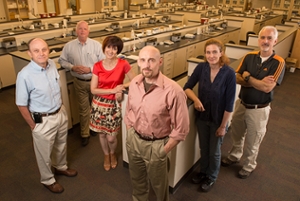 Southern Illinois University Edwardsville’s Ken Witt, PhD, professor of pharmaceutical sciences, and a team of researchers are seeking to renew a grant from the National Institute of Aging, a division of the National Institutes of Health (NIH), as they focus on oral drug delivery for long-term use in combatting Alzheimer’s Disease.
Southern Illinois University Edwardsville’s Ken Witt, PhD, professor of pharmaceutical sciences, and a team of researchers are seeking to renew a grant from the National Institute of Aging, a division of the National Institutes of Health (NIH), as they focus on oral drug delivery for long-term use in combatting Alzheimer’s Disease.
Alzheimer’s disease is a devastating neurodegenerative disorder of the brain, which robs individuals of their memory and eventually their capacity for performing the necessary tasks of daily living. Alzheimer’s is not a part of normal aging, but progresses over time. The degeneration of neurons in the brain eventually culminates in Alzheimer’s disease.
More than five million Americans currently are living with Alzheimer’s. By 2050, this number could rise as high as 16 million. The sixth leading cause of death in the U.S., Alzheimer’s kills more than breast cancer and prostate cancer combined, according to the Alzheimer’s Association. To date, Alzheimer’s has no cure and current medications have only short-term benefit. Without the development of better disease-modifying drugs, the financial, societal and emotional costs of this disease will continue to grow.
The process of treatment is complicated by the progression of the disease. Witt and his team recognize that the challenge is great. “Trying to treat a disease at mid-stage is an issue,” he said. “A person can go years without any symptoms being displayed.”
With a $2.65 million RO1 grant awarded in 2015, Witt has been the principal investigator leading a team of researchers composed of medicinal chemists, pharmacologists and pharmaceutics experts to develop a drug for the treatment of Alzheimer’s. Initial investigations by the research team began more than 10 years ago.
The group has reached the next level of assessment that requires further metabolism evaluations. They have finalized one patent and are moving others along the patent tree, while also seeking partners for licensing. Using the process of lead optimization, Witt and his team have been identifying and chemically modifying compounds with desirable characteristics for treatment of the disease. The goal has been to enhance specific properties of the target compounds to increase brain tissue viability and brain function, while limiting side-effects to the patient.
“The high cost of drug discovery is often the result of the undesirable off-target effects that can force the whole project to be reset,” Witt said. “Our job has been to optimize critical parameters early in the process, so that by the time the drug is tested in human trials, there is a greater chance of success.”
“The work of Dr. Witt and his colleagues in the SIUE School of Pharmacy is immensely important as they are evaluating a new biological target that may be involved in Alzheimer’s disease,” said SOP Dean Mark Luer, PharmD, FCCP. “At SIUE, investigators in the Department of Pharmaceutical Sciences are exploring the development of new medications to address disease processes that are not already being adequately treated. Dr. Witt’s research is exciting and could be the focus of a whole new drug discovery program.”
Photo(L-R): Mike Crider, professor and chair of the Department of Pharmaceutical Sciences, Bill Kolling, associate professor of pharmaceutics and pharmacokinetics, Maria Kontoyianni, professor of pharmaceutical sciences, Ken Witt, professor of pharmacology and toxicology, Karin Sandoval, associate professor of pharmaceutical sciences, and William Neumann, professor of synthetic organic chemistry.